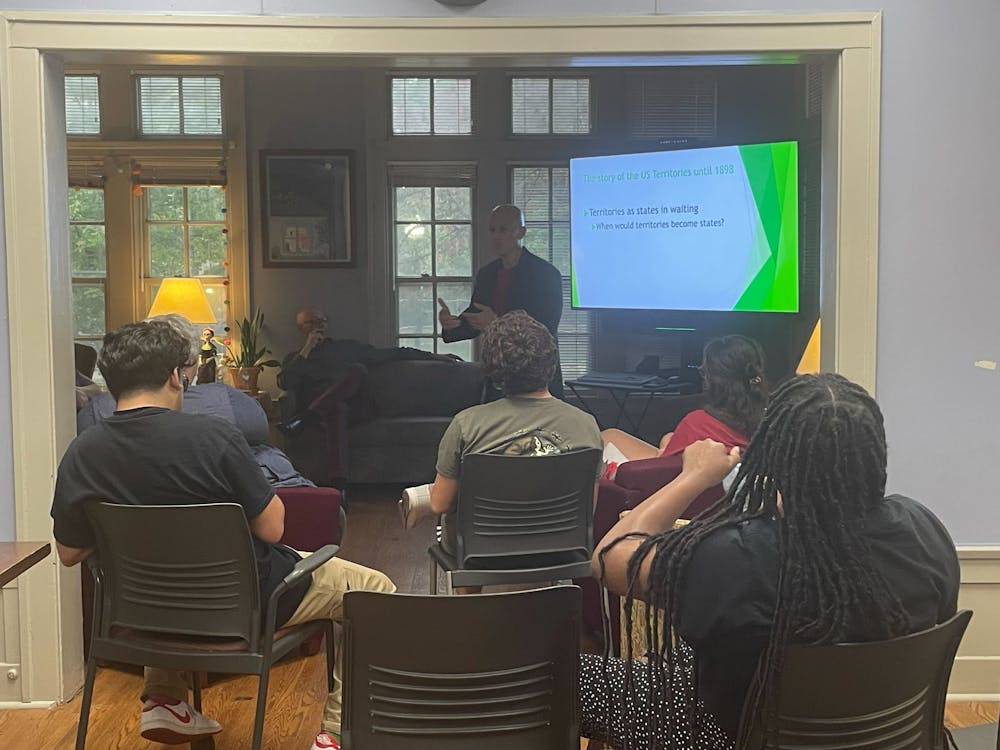At the “Does My Vote Count? Voting in the U.S. Territories,” event held at the La Casa Latino Cultural Center, speaker Luis Fuentes-Rohwer helped students navigate their voting rights for the upcoming election. Fuentes-Rohwer, a law professor at Indiana University, focused on the rights of U.S. citizens from U.S. territories.
This November, Puerto Ricans will be able to vote on the state of the territory, choosing between statehood, independence or independence with free association. Freely associated states are countries protected by the U.S., giving the military the right to access. This vote is non-binding, meant to demonstrate the preferences of citizens. In the end, Congress and the president have the final decision.
Currently, people living in U.S. territories, including Puerto Rico, cannot vote for federal positions.
Although, according to Indiana Code, students that are U.S. citizens from a U.S. territory, attending college in Indiana can vote in the presidential election if they register to vote under their current college address.
At the same time as the U.S. presidential election, Puerto Rico votes for their governor, the territory’s head of government. College students may only be registered to vote in one location, which will decide which election they vote in.
Residents of Puerto Rico, the U.S. Virgin Islands, Guam and the Northern Mariana Islands are U.S. citizens, but are all without representation in the U.S. Senate.
In the U.S. House of Representatives, each territory has one non-voting member. In presidential elections, residents of these territories can vote in the presidential primaries, but not the actual election. American Samoa also has a representative in the House of Representatives, but its residents are considered U.S. nationals, not U.S. citizens.
“(U.S. territories’) delegates to Congress are also very connected and advocating collectively on some of the issues around territories,” Bruce Smail, who is from the U.S. Virgin Islands and is the director of the LGBTQ+ Culture Center, said. “But all of them, including D.C., do not have voting power in Congress, so the most that they can do is negotiate, but they cannot vote.”
Territories are unable to vote for a very “simple” reason, according to Fuentes-Rohwer; the Constitution doesn’t say anything explicitly regarding the right to vote for anyone. Instead, it leaves it to the states.
“It gives it to states to hand out, and if you’re not a state, then you can’t vote until you become a state,” Fuentes-Rohwer said.
Tthe U.S. Constitution designed the electoral college for states. Its omission of territories means territories cannot vote in the presidential election.
In 2020, Puerto Rico held a referendum that garnered 53% of votes for statehood, and 47% against. To reach statehood, Congress and the president must decide to act on a majority vote from Puerto Rico’s referendum.
According to Fuentes-Rohwer, a U.S. citizen living in Puerto Rico, U.S. Virgin Islands, Guam or the Northern Mariana Islands would only receive “all the powers and rights given to state residents” if they decided to move and establish residency in a U.S. state.
“It’s very ironic,” Smail said. “We can vote in the presidential primary, and we have a vote that supposedly counts in the primary but not in the general election.”
At the event, Fuentes-Rohwer examined the current state of voting for U.S. territories beginning at the original territories.
“It is a racialized story,” Fuentes-Rohwer said, one about “race,” “conquest” and “empire.”
Up until 1898, he said, a U.S. territory was defined by the expectation that it would become a state. To be admitted as states, territories needed to have 60,000 people within the jurisdiction of the territory, and the territory’s government has to draft a constitution and submit it to Congress for review.
“Once you were a territory, you were on the path to statehood,” Fuentes-Rohwer said.
This trend, he said, continued with Arizona and New Mexico, and didn’t stop when it came to the territories that today have not reached statehood.
Fuentes-Rohwer said the difference between territories like Arizona or Wyoming and Puerto Rico, the Virgin Islands, American Samoa, Guam and the Northern Mariana Islands, which still do not have statehood, was their size.
According to Fuentes-Rohwer, the territories that exist today were simply too small. Former territories such as Arizona and New Mexico were big enough for the U.S. to create the population they desired, one with mostly white people.
“You can overwhelm them,” Fuentes-Rohwer said. “You just keep bringing people, you dilute whomever stay, or you pick land like in the Mexican-American War, where nobody lives. And once your people get there, then you’ll get (to statehood).”
With the island territories, this method was not possible.
“How do you do that in a place that is so small those people have no place to go?” Fuentes-Rohwer said, “You could round them up and ship them out, or you could kill them, or just wait them out. And that’s what we’ve chosen to do, just wait them out.”
In Indiana, voters can register online and use https://indianavoters.in.gov/ to validate their voting registration status, print mail-in registration forms, apply for absentee voting forms, find the time and location of their polling place and find out who’s on the ballot for this election.
The last day to request absentee ballots in Indiana is 12 days before the election, Oct. 24.
Voter registration in Indiana for the Nov. 5 election ends Oct 7. Voter registration in Puerto Rico ended Sept. 21.
On election day, voters must bring a photo ID that contains their photo, name, an expiration date (either current or expired sometime after the last general election, Nov. 8, 2022), and is either issued by Indiana or the U.S. government.
Editor’s note: Luis Fuentes-Rohwer is related to a writer currently on staff at the IDS. That writer was not involved in the reporting, writing or editing of this story.




